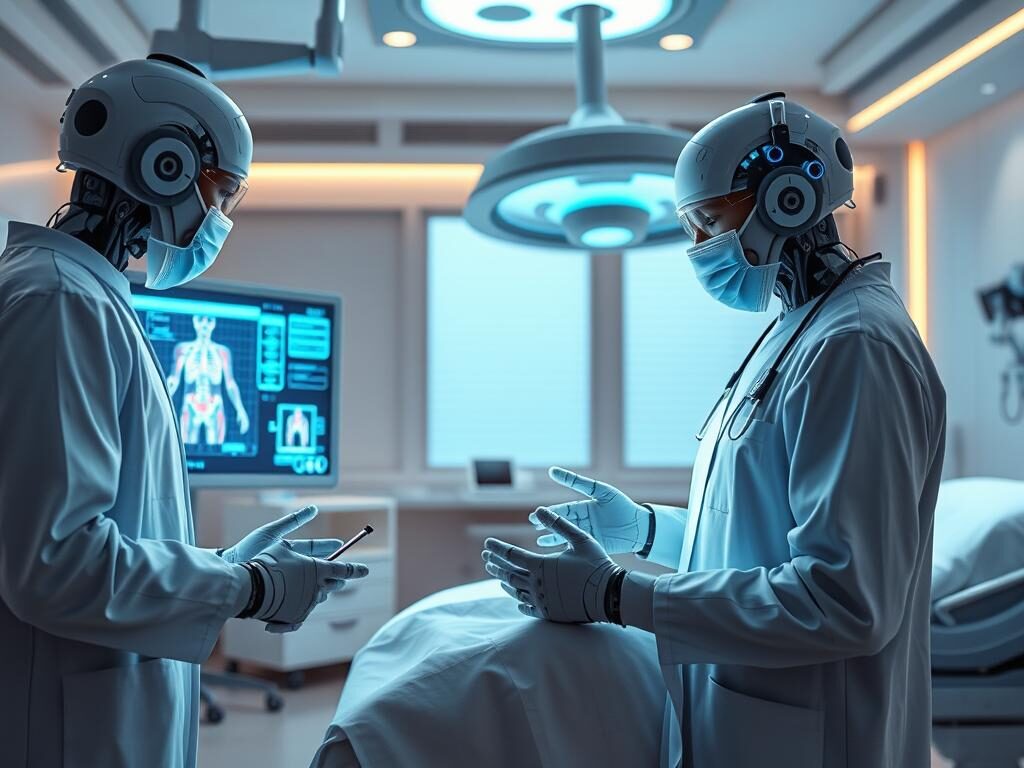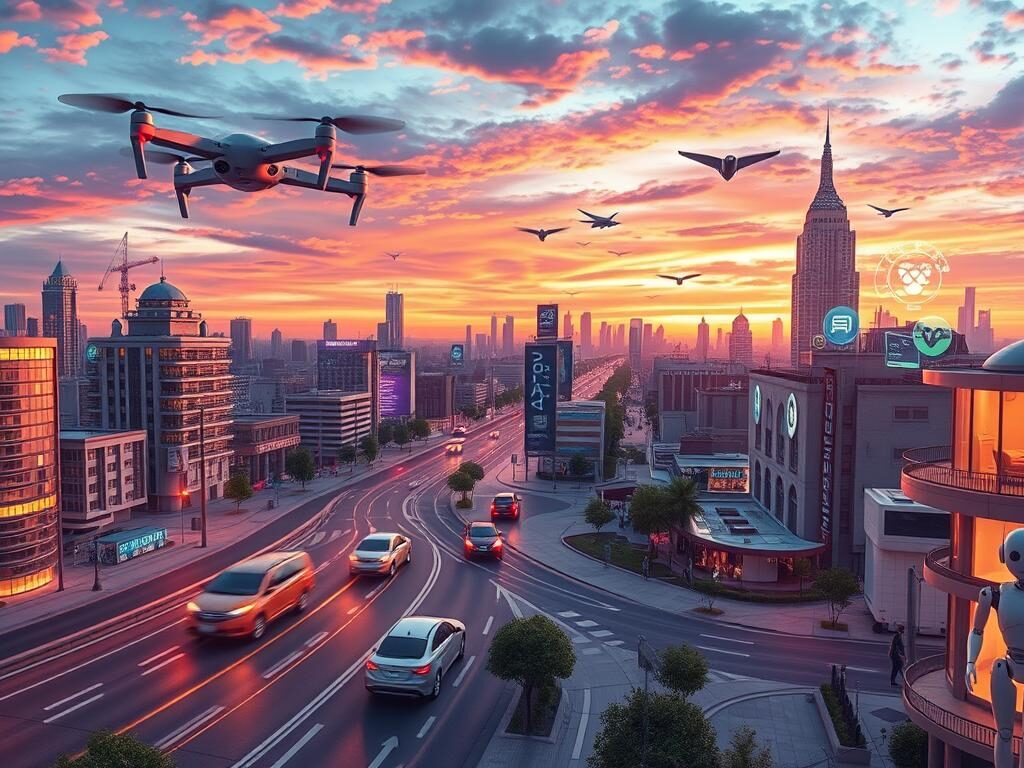Artificial Intelligence (AI) is changing our lives in big ways. It’s making healthcare better and changing how we travel. This article will cover AI’s basics, its uses in many fields, and the ethics of its growth.
AI is making healthcare better by helping doctors and preventing diseases. It’s also changing finance, transportation, and manufacturing. We’ll see how AI is opening up new ways to solve problems.
We’ll also talk about AI’s challenges, like bias and transparency. This ensures AI grows in a fair and responsible way. By the end, you’ll know how AI is changing our world and what the future holds.
Key Takeaways
- Explore the fundamental principles of Artificial Intelligence (AI)
- Discover how AI is revolutionizing various industries, from healthcare to transportation
- Understand the ethical considerations surrounding the advancement of AI technology
- Learn about the impact of AI on our world and the future possibilities it holds
- Gain insights into the challenges of bias and transparency in AI systems
What is AI and How Does it Work?
Artificial Intelligence (AI) is a fast-growing field in computer science. It aims to create systems that can do things humans do, like learn and solve problems. At its heart are machine learning and deep learning.
Understanding the Fundamentals of Artificial Intelligence
Machine learning lets computers learn from data and make choices on their own. They do this by looking at big datasets and finding patterns. This way, they get better over time. AI technology can automate tasks, make processes smoother, and help make better decisions.
Machine Learning and Deep Learning Explained
Deep learning is a step up from machine learning. It uses artificial neural networks to handle complex data. These AI algorithms can do even harder tasks by understanding data in layers. This makes machines think and decide like humans. AI capabilities keep growing as deep learning gets better, leading to big changes in many fields.
| Machine Learning | Deep Learning |
|---|---|
| Learns from data to make predictions or decisions | Uses artificial neural networks to process complex data |
| Requires structured data and feature engineering | Can handle unstructured data and learn features automatically |
| Suitable for a wide range of applications | Excels in tasks requiring complex pattern recognition |
As AI definition and its tech keep getting better, we see huge changes in many areas. From healthcare to finance, and even in how we enjoy entertainment, AI is changing our world.
AI’s Impact on Various Industries
Artificial Intelligence (AI) is changing many industries, especially healthcare. In medicine, AI is making a big difference. It helps doctors diagnose diseases better, create treatment plans for each patient, and find new medicines.
AI can look through lots of medical data. It finds patterns and gives doctors insights to help patients get better.
AI in Healthcare: Revolutionizing Patient Care
AI is changing healthcare in big ways. It automates simple tasks and helps with complex surgeries. This makes patient care more efficient, personalized, and effective.
AI is leading to new ideas in AI-powered healthcare and AI-driven medical innovations. These changes make workflows smoother, reduce mistakes, and improve care for patients.
| AI Applications in Healthcare | Impact on Patient Care |
|---|---|
| Automated Diagnosis and Triage | Faster and more accurate identification of medical conditions, leading to earlier interventions and improved patient outcomes. |
| Personalized Treatment Plans | AI-powered analysis of patient data helps develop customized treatment approaches, maximizing the effectiveness of therapies. |
| Robotic-Assisted Surgery | AI-guided surgical robots enhance precision and dexterity, resulting in less invasive procedures and faster recovery times. |

As AI in healthcare grows, its impact on patient care will get even bigger. Doctors are starting to use these AI-powered healthcare tools. They see the huge potential of AI-driven medical innovations to change the industry and help patients.
AI: Unlocking New Possibilities
The field of AI capabilities is growing fast, opening up amazing possibilities in many areas. AI-powered innovations are making things that were once science fiction a reality. They are changing how we live, work, and use technology.
AI is bringing us smart personal assistants that know what we need. It also helps make complex decisions easier. This technology is helping us solve problems better than ever before. It has the power to change many industries, like healthcare and transportation.
In robotics, AI is making advanced systems that can move, see, and talk to their surroundings. These AI future applications are leading to big changes in disaster response, space exploration, and making things.
“AI is not just a technology, but a catalyst for change that is reshaping our world in profound ways.”
As we keep using AI, the future looks very promising. It will make our lives better and open up new scientific discoveries. This technology is set to change what we think is possible.

Ethical Considerations and Challenges
AI is changing our world fast, and we must tackle the big ethical issues it brings. Problems like bias in AI, unclear AI decisions, and AI making things worse for some groups are big concerns. These issues are becoming more common.
Addressing Bias and Transparency in AI Systems
AI can sometimes make choices based on unfair biases. These biases can come from the data used to train AI or from the developers themselves. We need strong ways to check AI systems for fairness and to make sure they’re clear about their decisions.
Being open about how AI works is also key. It helps build trust and makes sure we’re all responsible for AI’s actions. Rules and standards for AI transparency and explainability are important for making sure AI is used right.
FAQ
What is Artificial Intelligence (AI)?
Artificial Intelligence (AI) is a field of computer science. It aims to create systems that can do things humans do, like learn and solve problems.
How does AI work?
AI uses two main ideas: machine learning and deep learning. Machine learning lets computers learn from data and make decisions. Deep learning is more advanced, using artificial neural networks to handle complex data.
What are the applications of AI in healthcare?
AI is changing healthcare by improving disease diagnosis and treatment plans. It analyzes medical data to help doctors make better decisions. AI also automates tasks and helps in surgeries, making care more efficient and effective.
What is the future potential of AI?
AI is opening up new possibilities in many areas. It’s leading to breakthroughs in robotics, language processing, and more. The future looks bright as AI continues to evolve and change our world.
What are the ethical considerations and challenges surrounding AI?
AI’s growth brings both promise and challenges. Issues like bias and lack of transparency are important. We must address these to ensure AI benefits everyone fairly and safely.










